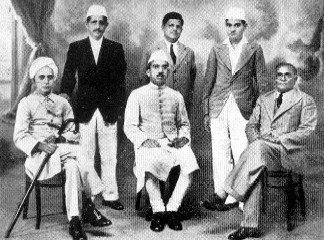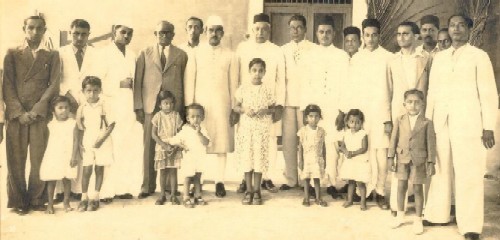
|
|
South Africa : 1938 |

After
the film ‘Dalit Kusum’, the Production Company of Govind Das ji was in the
same position of financial crisis as after the film ‘Dhuadhar’. After being
elected to Central Assembly in 1923, Govind Das ji had taken sincere interest in
the problems pertaining to non-resident Indians. During this period, he had
maintained correspondence with organisations and workers in Eastern and Southern
Africa. During his correspondence he conveyed his desire to come to Africa which
was welcomed by the Indians in Africa. Therefore he decided to go to Africa with
two objectives- to study the problems of the Indians and to lift up his film
production company from the losses.
Before
embarking on the voyage, he went to Wardha and informed Gandhiji of his desire
to go to Africa. He made it very clear to Gandhiji that he would take up journey
on a personal basis and not on behalf of Congress or the British government.
Gandhiji gave his consent. It proved to be a wise decision on part of Govind Das
ji, which did find importance in the coming time.

|
|
South Africa : 1938 |
On
October 10 in 1937, Govind Das ji accompanied by his son-in-law Lakshmi Chand
and a servant left the Bombay port on ship named ‘Tiariya’. His tour of the
African continent lasted for two months and eleven days and they visited
colonies of Kenya, Zanzibar, Tanganyika
and Uganda under British government and states in east Africa under Portuguese
government. Besides this, they visited Transwal and Natal regions.
Racial discrimination among the original inhabitants and the white was prominent. Though less in number, whites ruled over the Blacks (Negroes), the original inhabitants of the continent as well the Indians. Clear signs of discrimination were visible at public places. In Kenya, the Whites who were considered to be the high class could purchase plots high on the hilly terrain, while it was forbidden for the coloured population.
At one time, Govind Das ji too became a victim of such treatment. The incident took place when he was on his way to meet with Minister in the Union government Mr. Hofmayor at the capital of South Africa, Pretoria. Mr. Nana, Minister of Transwal Indian Congress and others accompanied him. The office of Mr. Hofmayor was in the Standard Bank building. While Govind Das ji along with others was about to get into the lift. A Dutch liftboy stopped him from entering the lift. The matter was brought to the knowledge of Mr. Hofmayor who directed his Secretary to instruct the liftboy.

|
|
Mozambique, Africa |
But
despite the orders, he refused to take the guests. For him taking orders from
coloured people was an insult. Ultimately the Secretary of Mr. Hofmayor had act
as the liftboy for the guests. But wherever he went, during his stay, the
Indians greeted him with open arms. The significant contribution made by Govind
Das ji was the initiation of Clove trade from Zanzibar. Indians had boycotted
the clove trade due to a colonial Clove trade law and decree. Understanding the
problem, Govind Das ji worked out with the Minister of the Colonial state, Lord
Dufferin and helped the people to initiate the trade.
Since
the election to Central Assembly, Govind Das ji had focussed his attention
towards the problems of Non-Resident Indians living in Africa. The visit to the
continent proved to be fruitful both ways for Govind Das ji. After 2 months
tour, he came back to India by boarding the ship ‘Takliva’. He even wrote a
book entitled ‘Hamara Pradhan Upnivesh’ on his journey to Africa.
By the time, Govind Das ji returned the Congress Session was being organised at Haripur. Subhash Chandra Bose was chosen as President of the session. Here, voices were heard alleging that Govind Das ji used the name of the Congress party on his purely personal visit to Africa. Bhulabhai Desai and Sadar Vallabh Bhai Patel were the senior members alleging this. Some members were of the view that like in the case of Mr Narimen earlier, Govinddasji should also be expelled from the Congress party. Govind Das ji, put up a tough stand against these allegations and directly confronted the senior leaders as well including Mr Patel and Mr Desai. Since these leaders were insistent on their stand, Govinddasji had to tackle them by acquainted them both with the fact that prior to leaving for Africa he had taken the consent of Gandhiji. His foresightedness helped him in this sticky situation.